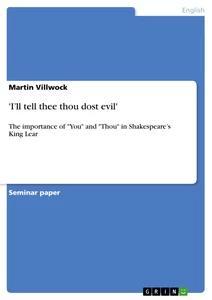Bücher versandkostenfrei*100 Tage RückgaberechtAbholung in der Wunschfiliale
NEU: Das Hugendubel Hörbuch Abo - jederzeit, überall, für nur 7,95 € monatlich!
Jetzt entdecken
mehr erfahren
Zustellung: Mo, 08.09. - Mi, 10.09.
Versand in 2 Tagen
VersandkostenfreiBestellen & in Filiale abholen:
Seminar paper from the year 2005 in the subject English Language and Literature Studies - Linguistics, grade: 1,7, University of Cologne (Englisches Seminar), course: English Grammar synchronic and diachronic aspects, language: English, abstract: In Middle English and Early Modern English one could choose either You or Thou (and their respective variants see Simpson et al. 2005: entry Thou, pers., pron., 2nd sing.). Either choice carried a number of implications, depending on the period of time in the language (Barber 1976:204-210). This system, which exists in many (but predominately European) countries is generally referred to as the T/V distinction.
Although similar to the German T/V distinction (Blake 1983:6), there is a phenomenon in Early Modern English, particularly in Shakespeare s plays, which sets the You/Thou distinction apart. Whereas in German, French or Italian, it would be very rare and even rude to switch back and forth from T to V or the other way around, this must have happened quite frequently in Early Modern English dialogues (Brown and Gilman 1960:274-275). Eventually, of course, the use of Thou declined leaving the English language with only one second person pronoun, serving all cases without alteration (except possessive Yours and determiner Your) and both singular and plural (Görlach 1991:85).
A speaker of Early Modern English consequently had not only the option of choosing T or V once, he or she could also switch within a conversation, sometimes within a single utterance. The choice then would carry certain implications, about the emotions of the speaker, about his fondness or dislike of the addressee, or about the social ranks of both addresser and addressee. As a result, choosing the pronoun became a tool in dialogues that could be used to acknowledge or insult.
The T/V distinction will be discussed, its appearance in Early Modern English and particularly Shakespeare s language. Then, in order to attain an achievable amount of research for a paper of this size, one of Shakespeare s plays will be regarded with some detail. The choice fell on King Lear...
Although similar to the German T/V distinction (Blake 1983:6), there is a phenomenon in Early Modern English, particularly in Shakespeare s plays, which sets the You/Thou distinction apart. Whereas in German, French or Italian, it would be very rare and even rude to switch back and forth from T to V or the other way around, this must have happened quite frequently in Early Modern English dialogues (Brown and Gilman 1960:274-275). Eventually, of course, the use of Thou declined leaving the English language with only one second person pronoun, serving all cases without alteration (except possessive Yours and determiner Your) and both singular and plural (Görlach 1991:85).
A speaker of Early Modern English consequently had not only the option of choosing T or V once, he or she could also switch within a conversation, sometimes within a single utterance. The choice then would carry certain implications, about the emotions of the speaker, about his fondness or dislike of the addressee, or about the social ranks of both addresser and addressee. As a result, choosing the pronoun became a tool in dialogues that could be used to acknowledge or insult.
The T/V distinction will be discussed, its appearance in Early Modern English and particularly Shakespeare s language. Then, in order to attain an achievable amount of research for a paper of this size, one of Shakespeare s plays will be regarded with some detail. The choice fell on King Lear...
Produktdetails
Erscheinungsdatum
26. November 2007
Sprache
englisch
Auflage
2. Auflage
Seitenanzahl
28
Autor/Autorin
Martin Villwock
Verlag/Hersteller
Produktart
kartoniert
Gewicht
56 g
Größe (L/B/H)
210/148/3 mm
ISBN
9783638861991
Entdecken Sie mehr
Bewertungen
0 Bewertungen
Es wurden noch keine Bewertungen abgegeben. Schreiben Sie die erste Bewertung zu "'I'll tell thee thou dost evil'" und helfen Sie damit anderen bei der Kaufentscheidung.









